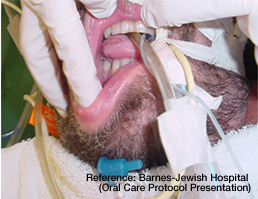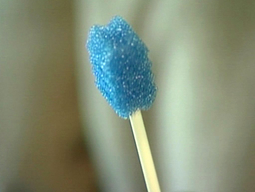Why is Oral Hygiene Important?
The Problem
 Being admitted into hospital can be a worrying time for patients and their families but increasingly, there is the additional worry of catching potentially fatal hospital-acquired infections like pneumonia.
Being admitted into hospital can be a worrying time for patients and their families but increasingly, there is the additional worry of catching potentially fatal hospital-acquired infections like pneumonia.
Patients that have to be moved to intensive care have a 10% to 20% chance of developing pneumonia, if that patient then becomes so unwell that they need to be intubated then the risk increases significantly to between 10% and 50%.
Each day that the patient remains intubated increases their chances of contracting pneumonia by an additional 3%. Pneumonia that occurs solely as a result of being ventilated is known as Ventilator-Associated Pneumonia (VAP).
Each year in the USA, there are more than 200,000 cases of VAP. Each case prolongs the hospital stay by at least four to nine days, at a cost of more than $1 billion a year. Pneumonia contributes to 15% of all hospital deaths, and it is estimated that one-third to one-half of those deaths would not have occurred if it had not been for the pneumonia.
Current Ineffective Practices
 Most hospitals use foam sticks or “toothettes” and oral suctioning with a yankauer to perform oral hygiene on critically ill patients, while these methods can provide temporary comfort care for the patient, they do not facilitate the removal of plaque nor the stimulation of salivary flow that are essential components in good comprehensive oral care, they simply serve to move the bacteria from one location in the oral cavity to another.
Most hospitals use foam sticks or “toothettes” and oral suctioning with a yankauer to perform oral hygiene on critically ill patients, while these methods can provide temporary comfort care for the patient, they do not facilitate the removal of plaque nor the stimulation of salivary flow that are essential components in good comprehensive oral care, they simply serve to move the bacteria from one location in the oral cavity to another.
Removing plaque and in so doing, vastly reducing bacteria is key to reducing the episodes of VAP in intensive care units, however, health professionals currently have inadequate tools and procedures to deliver such a vital treatment effectively.
A few hospitals are moving towards using a normal tooth brush and a suction tube or yankauer to perform oral hygiene on their critically ill patients. While this approach is more in-line with evidence based best practice it can also be potentially dangerous as there is the possibility of fluid entering the patients lungs, the procedure can also be very time consuming and in some institutions is considered to require two health professionals to implement. Cleaning the patients tongue, a known haven for bacteria, can also be hazardous using this method.
We aim to provide a revolutionary product that will replace the current ineffective tools being used on critically ill patients and will continue to work closely with health professionals to establish new evidence based protocols that together with our product (The AGATHA Oral Hygiene System) will completely revolutionize how oral hygiene is delivered world-wide.

